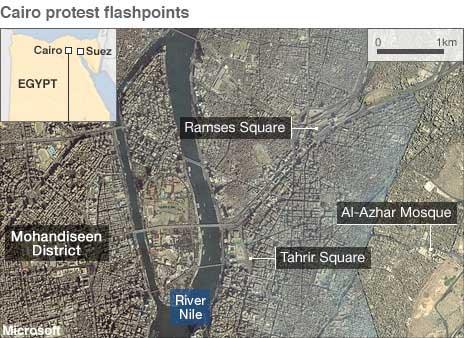Egypt protests escalate in Cairo, Suez and other cities
- Published
Police used tear gas and water cannons to disperse the crowds, who responded by attacking police vehicles
Anti-government protests are intensifying across Egypt, as police clash with demonstrators in several cities demanding the resignation of President Hosni Mubarak.
A protester in Suez was killed in clashes with police, witnesses said.
In Cairo, police used tear gas and water cannon to disperse the crowds, who responded by throwing stones.
Live TV pictures from Cairo showed what appeared to be army vehicles on the streets.
In one location, an army vehicle appeared to go into reverse when it was surrounded by protesters who raised their fists in celebration.
Cairo, Alexandria and Suez have been placed under curfew effective from 1800 to 0700 local time (1600 to 0500 GMT). State television said President Hosni Mubarak had decreed the curfew to stop riots, lawlessness and attacks on property.
Corruption
Internet and phone services - both mobile and landline - have been severely disrupted, although protesters are using proxies to work around the restrictions.
Reports say Egyptian opposition figure Mohamed ElBaradei has been placed under house arrest. Earlier, he was soaked by water cannon and surrounded by police as he joined protesters on the streets of Cairo.
At least eight people have been killed and dozens injured since the protests against unemployment, corruption and rising prices began on Tuesday. Up to 1,000 people have been arrested.
The unrest follows an uprising in Tunisia two weeks ago, in which President Zine al-Abidine Ben Ali was toppled after 23 years in power.
After Friday prayers, tens of thousands of people joined protests in Cairo and other cities to demand the end of Mr Mubarak's 30-year rule.
They shouted "down, down with Mubarak" and "the people want the regime to fall".
At several locations, riot police responded by firing rubber bullets and tear gas, and by using water cannon. BBC Arabic reporter Assad Sawey, in Cairo, said he was arrested and beaten by plainclothes policemen.
"They took my camera away and when they arrested me, they started beating me with steel bars, the ones used here for slaughtering animals," he said.
The police wanted to take him to a state-run hospital, he said, but he refused to go as the hospital is notorious for handing patients back to police once they have been treated.
'Fear barrier'
Reuters news agency said protesters had also gathered outside al-Azhar mosque, and near one of the presidential residences in the capital.
The French government said it had received reports that four French journalists covering the protests in Cairo had been arrested. They were later released.
BBC journalist Assad Sawey was arrested and beaten by 'brutal' police
There were also reports of clashes between protesters and police in Alexandria, Mansoura and Aswan, as well as Minya and Assiut south of Cairo, and al-Arish in the Sinai peninsula.
In anticipation of the unrest, riot police were deployed around the capital, at the entrances to bridges across the River Nile, at Tahrir Square - the scene of protests earlier this week - and other key intersections.
Friday's rallies in Egypt were expected to be the biggest so far, with people urged via internet sites to join after attending prayers.
The organisers called on people to come out in force, stressing that the religion of protesters was not relevant.
Egyptian film-maker Ahmed Rasheed, who was planning to take part in Friday's demonstrations, said people no longer feared arrest.
"We have broken this fear barrier," he told the BBC. "People are taking to the streets, young people, all walks of life, educated, non-educated, higher social classes, lower social classes."
Connections down
The protests took place despite widespread disruptions to internet and mobile-phone connections from early on Friday.
Mobile operator Vodafone Egypt said in a statement: "All mobile operators in Egypt have been instructed to suspend services in selected areas. Under Egyptian legislation the authorities have the right to issue such an order and we are obliged to comply with it."
Overnight there was also an apparent crackdown on the banned Islamist opposition movement, the Muslim Brotherhood, after it said it would back the Friday protests.
A lawyer for the Muslim Brotherhood told the BBC that tens of its members had been arrested.
Despite an official ban, the Muslim Brotherhood remains Egypt's largest and most organised opposition movement.
